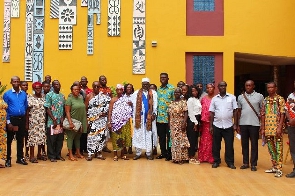The extractive sector of Ghana has been a crucial contributor to the country's economy for several decades, particularly the mining sector, which has played a critical role in revenue mobilization, foreign exchange earnings, employment creation, and overall stimulation of the Ghanaian economy.
Despite this, multinational gold mining companies operating in mineral-rich developing countries continue to benefit from their activities, while the nexus between company profits, socioeconomic, and environmental outcomes in the local communities within which they operate remains weak.
Communities lose lands, cultural sites, cultural identity, income-earning assets and sources, networks, and social ties due to resettlement, while also facing challenges such as environmental degradation and human rights abuses. The 1992 constitution and the Minerals and Mining Act, 2006, along with other regulations, have been enacted to address fair, adequate, and timely payment of compensation claims and resettlements.
However, the current legal and regulatory regime has been criticized for failing to compensate for lands and the use of common resources in communities, leading to a need for further understanding of power dynamics, processes, actions, and community experiences regarding what the law states and what is practiced.
A new report by Obuasi based research and advocacy group Cesis sheds light on the experiences of mining communities in Ghana with regard to compensation and resettlement. The Center for Social Impact Studies (CeSIS) with support from the Third World Network through the Power of Our Voices Project (PVP), aimed to investigate the challenges faced by mining communities and to influence policies for communities affected by resettlement.
The report, which was validated by the community and has been made available, reveals that compensation and resettlement are among the most common issues raised by mining communities in Ghana. The findings highlight the need for continued efforts to promote responsible mining practices and to ensure that the interests of affected communities are prioritized.
Throwing more light on the report, Robert Ali Tanti the Executive Director of the Center for Social Impact Studies (CESIS) said through interactions with the communities, they discovered that compensation and resettlement are among the most common issues raised, with even those who had been previously compensated expressing dissatisfaction with the compensation received.
To address these issues, he said CeSIS undertook a research project with support from the Third World Network through the Power of Our Voices Project (PVP), aimed at investigating the experiences of mining communities with regard to resettlement and compensation. The research was conducted in the Ashanti and Ahafo Regions, with Obuasi being the focus area due to its status as the city with the most mining activities in the Ashanti Region.
Robert Tanti further disclosed that three communities were selected for the research, including Anhwiem, a community seeking resettlement, Dokyiwaa, a recently resettled community, and Bediem, a community resettled in 1996, with the goal of influencing policies for communities affected by resettlement and helping those who have been affected by such policies.
The research also aimed to assist communities to build capacity to negotiate better with their findings. The team employed four strategies in data gathering, including conducting surveys and using the Slovin's formula to calculate the sample size. They also conducted key informant interviews with people involved in the resettlement process, particularly in the Dekyiwaa and Bediem communities, and held focused group discussions.
The Executive Director of CeSIS noted that the team had conducted their analysis, validated the report two weeks prior, and the report was now available. They had conducted community validation of their findings and engaged the media to spread awareness about their research and the laws governing resettlement.
He emphasized that people and communities who are resettled should have a better life than their previous location, but most people affected by resettlement are not satisfied with their new location and environment.
A Resource person for the day Richard Elimah, expounded on the substantial economic benefits of mining in Ghana, highlighting its role as the highest contributor to domestic revenue in the country. He drew attention to the critical contribution of both large-scale and small-scale mining to the country's economy and the significant employment opportunities they provide.
Specifically, he pointed out that the mining industry employs over 12,000 people in the large-scale mining sector, while the number of people employed in small-scale mining exceeds 40,000 and could even reach as high as a million.
Beyond the economic benefits, Mr. Elimah also addressed the legal framework and principles of compensation surrounding mining activities in Ghana. He provided attendees with a detailed explanation of the applicable laws, ensuring that they were familiar with the legal framework that regulates mining activities in the country. He emphasized the importance of fairness and equity in compensation for communities affected by mining activities.
Again, he highlighted some of the key principles that guide the compensation process, stressing the importance of a consultative approach that involves affected stakeholders throughout the process. Mr. Elimah underscored the significance of engaging with community members in the compensation process, ensuring that their concerns and interests are adequately represented.
The participants emphasized the importance of organizations like CeSIS in promoting responsible mining practices and ensuring that the voices of affected communities are heard. By providing a platform for stakeholders to engage and share their experiences, organizations like CeSIS play a critical role in promoting greater transparency, accountability, and equitable distribution of benefits in the mining sector.
In all, the participants positive response to CeSIS's presentation highlighted the need for continued efforts to promote responsible mining practices in Ghana and to ensure that the interests of affected communities are prioritized.
The insights provided by CeSIS's research and engagement efforts will be instrumental in shaping policy decisions and driving meaningful change for the betterment of mining communities in Ghana.
Regional News of Monday, 20 February 2023
Source: Sampson Manu

















